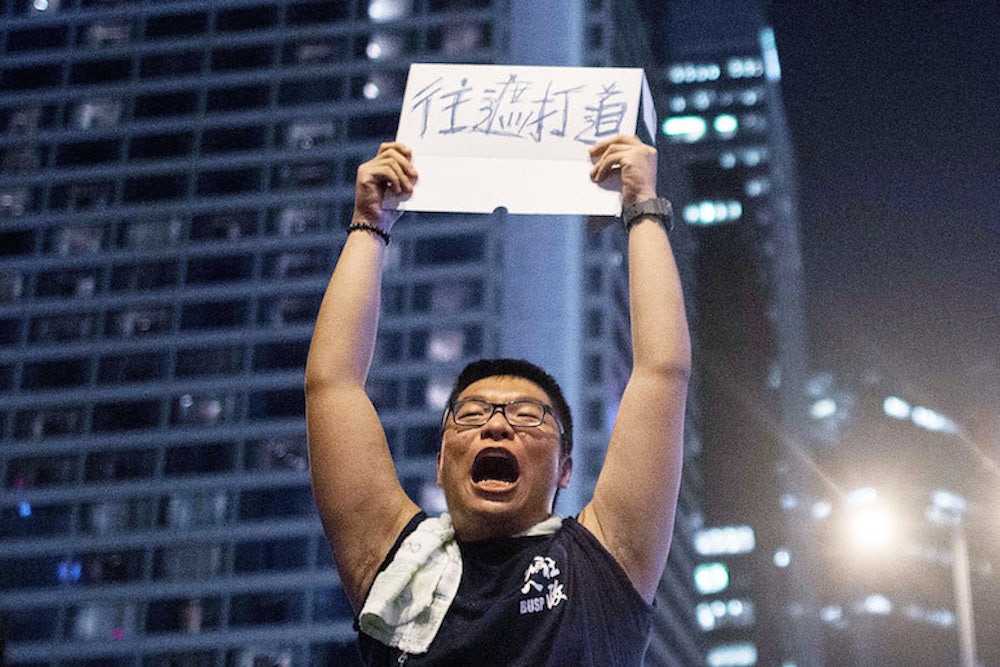As the pro-democracy protests in Hong Kong escalate and streets clog with angry residents, the demonstrators are beginning to receive supportive messages from places as far away as Ferguson, Missouri. But what truly scares the Chinese Communist Party in Beijing is the possibility of sympathetic protests popping up in mainland China, where citizens live under its authoritarian thumb. Last week, a small group of mostly elderly Shanghai residents posed for a picture holding signs proclaiming, “The people of Shanghai support the people of Hong Kong in demanding true elections with their Occupy movement.” It raises the question: Will Hong Kong’s pro-democracy protests spread to mainland China?
Experts say it’s unlikely. While this week’s demonstrations may be the largest in Hong Kong in recent years, the city is no stranger to protests. “Every stage of constitutional development has seen some sort of protest,” said Professor David Lampton of Johns Hopkins’s School of Advanced International Studies. In 1989, an estimated 1.5 million Hong Kong residents protested in the central district in solidarity with pro-democracy demonstrators in Tiananmen Square. Years later, in 2003, hundreds of thousands took to the streets to protest a proposed security law that would allow for life sentences in the case of treason in Article 23 of the constitution. Since then, crowds have gathered in the tens of thousands each July 1 in pro-democracy rallies. This week’s protests are similar to those in Hong Kong’s past, as residents speak out against Beijing’s meddling in city elections.
Hong Kong’s decades-long history of protests means that the progressive city’s residents know how to organize when push comes to shove. On the mainland, however, the state represses any whisperings of an uprising quickly. Already, the Chinese propaganda machine has kicked into gear. Reports surfaced on Sunday that Instagram was disabled in the mainland, keeping Chinese eyes shielded from frontline photos of the protests. Search engines also began scrubbing references to Hong Kong in results, and mainland newspapers like China Daily included only small items on the tumult. According to Bloomberg News, many mainlanders managed to catch the news before it disappeared under censors’ erasers, but to many the motives and scale of the protests are unclear.
According to Professor Mary Gallagher at the University of Michigan, the Chinese government has become more adroit at dealing with protests by combining repression with some small concessions. And while the Chinese mainland has plenty of local protests about specific issues, Chinese mainlanders have little experience with large-scale political organization. Their inexperience, combined with the state’s relentless security apparatus, means that a mainland protest would be tough to pull off.
Besides the logistical difficulties of protests outside Hong Kong, many Chinese mainlanders aren’t necessarily sympathetic to the province’s protests. As plenty of Chinese see it, Hong Kong has it pretty good. “There is a portion of China that thinks Hong Kong people are unduly whining,” Lampton said. This spring, when a mainland tourist toddler was filmed defecating on a busy Hong Kong street, the ensuing ruckus—coined “bladdergate” by netizens—revealed the widespread distaste Hong Kongers feel toward mainlanders. That month, a Sina.com poll showed that 85 percent of mainlanders felt that Hong Kongers were prejudiced against them. Others in the mainland believe propaganda that paints the Hong Kong protests as signs of Western meddling.
While Beijing doesn’t need to worry about copycat protests across China in the coming days, it’s true that the mainland’s lack of political reform is a problem that won’t be going away. The government has only become more repressive on the mainland in recent years, and if the CCP concedes to Hong Kong’s demands, the gap between Hong Kong and the mainland’s political reform will only increase. “The concern is that people in the mainland will start asking, ‘Well, why can’t we have that?’” Gallagher said.
